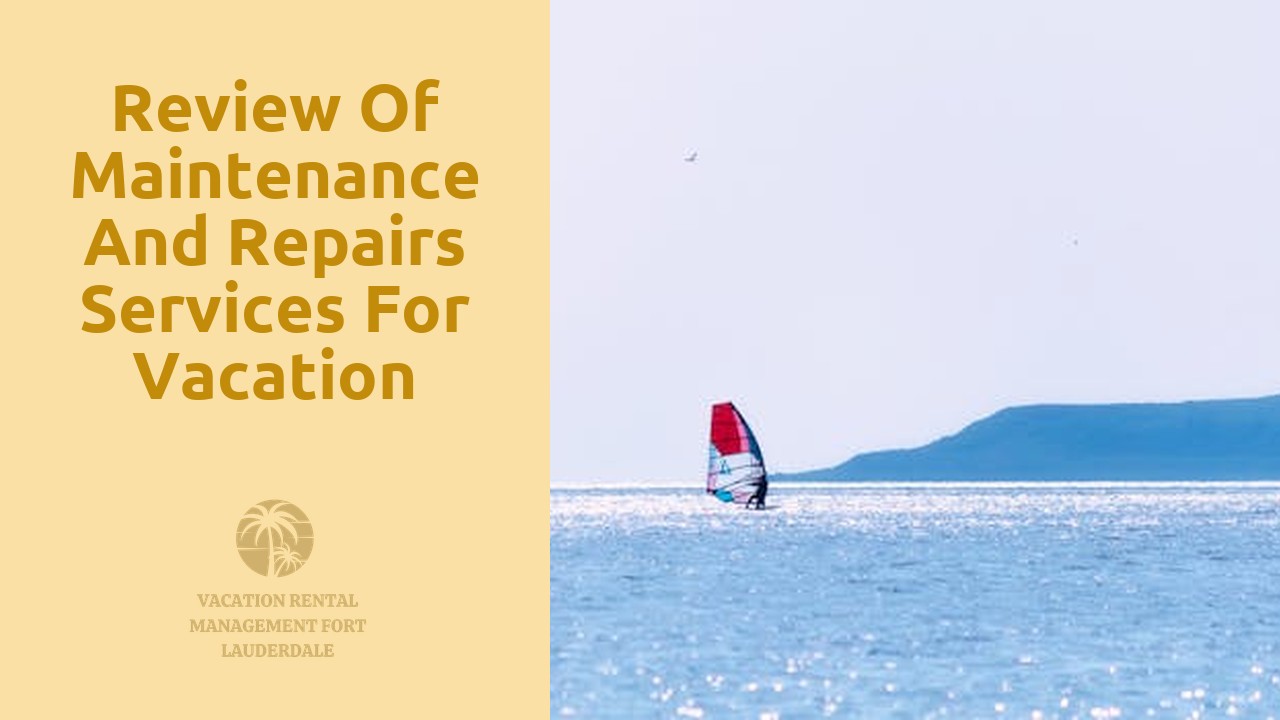
Review of Maintenance and Repairs Services for Vacation Rentals
Table Of Contents
Vendor Management for Maintenance Tasks
Vendor management for maintenance tasks is a crucial aspect of ensuring the upkeep and functionality of vacation rentals. Effectively coordinating with vendors to carry out maintenance and repair work in a timely manner is essential for ensuring guest satisfaction and positive reviews. Communication and organization are key components in successful vendor management to guarantee that tasks are completed efficiently and to the highest standards.
Establishing a reliable network of vendors is imperative for property managers to swiftly address maintenance issues as they arise. By fostering strong relationships with vendors, property managers can streamline the process of scheduling and executing maintenance tasks. Clear expectations, prompt responses, and attention to detail are fundamental in vendor management to uphold the overall quality and appeal of vacation rental properties.
Coordination of ThirdParty Service Providers
Coordination of third-party service providers is a crucial aspect of managing maintenance and repairs for vacation rentals. Establishing strong communication channels and clear expectations with external vendors helps ensure that tasks are completed efficiently and to the highest standards. By maintaining regular contact and providing detailed instructions, property managers can enhance the overall guest experience and minimize any disruptions during a guest's stay.
Moreover, fostering positive relationships with third-party service providers can lead to prioritized service and timely responses to maintenance requests. When vendors feel valued and respected, they are more likely to go the extra mile to meet the needs of the vacation rental property. This collaborative approach not only increases the likelihood of quick problem resolution but also contributes to a positive working environment built on trust and reliability.
Technology Integration in Maintenance Services
In the competitive landscape of vacation rentals, technology integration plays a crucial role in enhancing maintenance services. By leveraging automated systems and innovative tools, property managers can streamline operations, allocate resources effectively, and ensure timely maintenance tasks are completed. These technological advancements not only improve efficiency but also enhance the overall guest experience through prompt resolution of any maintenance issues.
Additionally, implementing state-of-the-art maintenance software allows for better tracking of maintenance activities, simplifying communication between property managers and maintenance staff. Real-time updates and alerts can prevent potential issues from escalating, leading to quicker resolutions and increased guest satisfaction. Embracing technology in maintenance services is not just a trend but a strategic necessity in today's fast-paced vacation rental industry.
Automated Systems for Streamlined Operations
When it comes to managing vacation rentals efficiently, utilizing automated systems is key to streamlining operations and enhancing overall productivity. These systems offer a range of benefits such as real-time updates, task assignments, and seamless communication channels between property managers and maintenance staff. By automating routine processes like work order assignments and scheduling, property owners can ensure that maintenance tasks are completed promptly and without delays.
Moreover, automated systems enable property managers to track maintenance requests, monitor progress, and analyze data to identify trends and areas for improvement. This level of visibility allows for proactive maintenance planning and cost-effective decision-making. By harnessing the power of automation in rental property maintenance, property owners can optimize operations, improve guest satisfaction, and ultimately maximize their return on investment.
Budgeting and Cost Control Strategies
One key aspect of managing vacation rental maintenance and repair services effectively is implementing robust budgeting and cost control strategies. By establishing a clear budget for maintenance tasks and sticking to it, property owners can ensure that their expenses are kept in check while still maintaining the quality of their rental properties. It is essential to conduct regular reviews of expenses related to maintenance and repairs, identifying areas where costs can be minimized without compromising the overall guest experience. By tracking expenses closely and adjusting the budget as needed, property owners can optimize their spending and maximize profitability.
In addition to setting a budget, property owners should explore cost control strategies that help reduce maintenance expenses without sacrificing the quality of service. This might involve negotiating competitive pricing with vendors and third-party service providers, leveraging bulk discounts for supplies, or implementing preventative maintenance measures to avoid costly repairs down the line. By actively seeking out cost-effective solutions and staying proactive in managing maintenance expenses, property owners can ensure that their vacation rentals remain profitable in the long run.
Implementing CostEffective Maintenance Plans
Implementing cost-effective maintenance plans is essential for property owners looking to maximize their rental profits while ensuring guest satisfaction. By strategically planning and executing maintenance tasks, owners can prevent major issues from arising and maintain the overall quality of their vacation rental properties. One effective strategy is to schedule regular inspections and maintenance checks to identify potential problems early on, allowing for timely and cost-efficient repairs.
Furthermore, investing in preventive maintenance measures, such as routine servicing of appliances and systems, can help extend the lifespan of equipment and reduce the likelihood of costly breakdowns. By prioritizing proactive maintenance over reactive repairs, property owners can minimize expenses in the long run and create a more enjoyable experience for guests. Ultimately, implementing cost-effective maintenance plans involves a combination of strategic planning, regular upkeep, and a focus on maximizing the value of the property through efficient maintenance practices.
Related Links
Roundup of Essential Maintenance and Repairs for Vacation RentalsTop 10 Maintenance and Repairs Tips for Vacation Rentals
The History of Maintenance and Repairs in Vacation Rental Management
What to Look for in Appliance Maintenance and Upkeep for Vacation Rentals
Why Landscaping and Exterior Maintenance are Important for Vacation Rentals
Why Emergency Repairs Protocol is Essential for Vacation Rentals
How to Conduct Regular Property Inspections for Vacation Rentals
How to Establish an Emergency Repairs Protocol for Vacation Rentals
What to Consider When Hiring Cleaning and Housekeeping Services for Vacation Rentals